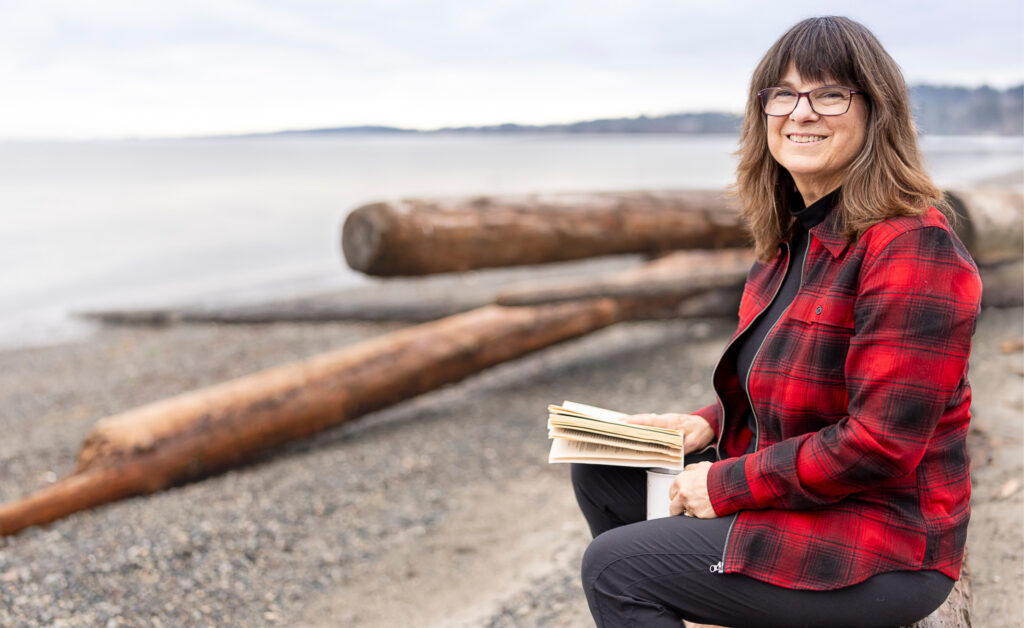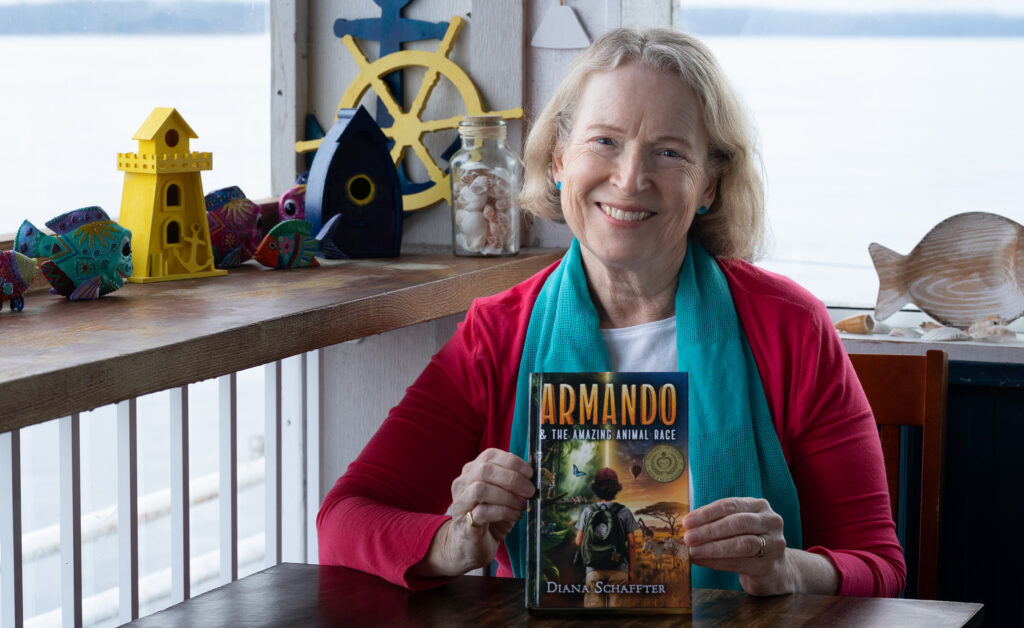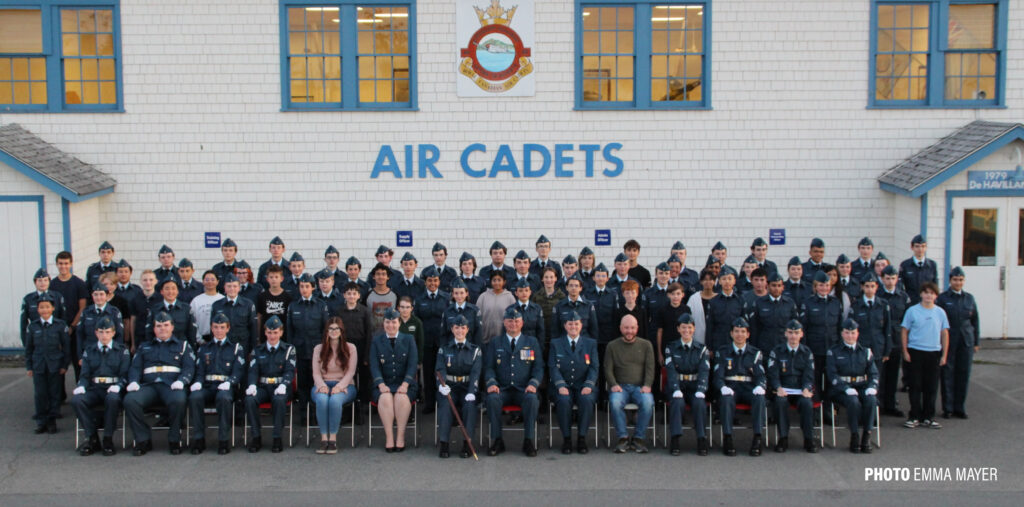by Jesse Holth | photo by Leah Gray –
There is no expiry date on creativity – many famous writers did not get their start until later in life. I chatted with Jann Everard about her debut collection of short stories, Blue Runaways (March 2024, Stonehewer Books), available now for pre-order at Tanner’s Books, Bolen Books, Munro’s Books and elsewhere. The Blue Runaways book launch will be held at Small Gods Brewing Co. in Sidney on Sunday, May 5, from 3 to 5 p.m.
How did you get your start as a writer?
Like many writers, I was an enthusiastic reader first. I wrote for work but didn’t contemplate creative writing until I had children. Reading to my two (now adult) boys, I felt inspired to write a picture book. As it turns out, writing for children is much harder than it appears! After taking some writing classes through continuing education and attempting a novel for middle-grade readers, I was encouraged by a kind editor to try adult short fiction. That turned out to be where I was most comfortable as a writer.
Where do you find your inspiration?
I understand many writers start with a character or voice, but I’m usually inspired by a place. The stories in Blue Runaways range in location from Grasslands National Park in Saskatchewan, to a nordic ski trail in Ontario, to inside a lava tube in Iceland. I imagine situations that might generate the strong human emotions that physical landscapes can evoke.
The stories in this book share a common theme: loss. What made you decide to focus on this subject?
The stories in Blue Runaways were originally written without any plan to gather them together into a collection with a shared theme. Those years coincided with a period when I was experiencing considerable loss in my personal life.
The words “loss” or “lost” find their way into daily usage often, and I find that interesting. We talk about lost opportunities, being lost in thought, having lost hope. In The Covenant of Water by Abraham Verghese, the author writes “… what is time but cumulative loss?” It’s natural to reflect on loss as we age.
Your main characters are all women, each facing their own kinds of loss. They react very differently – does how we deal with grief and where we find solace say something about who we are, and how we can move on?
How we are able to process loss is affected by so many factors and personal circumstances. I recognize that running away or seeking solace “elsewhere” or in nature is a privilege not everyone enjoys. More universal is our human tendency to avoid pain and uncomfortable feelings. I personally take comfort in the saying that grief is leftover love.
The title story, “Blue Runaways,” won the Malahat Review Open Season Award for Fiction in 2018. Would you say it’s your favourite piece in the collection?
That’s like asking if I have a favourite child! I tend to look at stories as either “easier” or “more difficult” for me to write rather than as a favourite or not. Now and then, I’ll be lucky enough to have a fully-formed story in my head when I sit down to write. For example, the first version of the story The Bus Stops Here was written in a tent over a single day as I waited for my husband, son and a friend to climb Mt. Charlton in Jasper National Park.
Do you have a daily writing practice? What does it consist of?
I admire writers who establish a daily practice, but the expectation to write daily can put a lot of pressure on aspiring writers. Historically, I’ve fit writing around my other roles as wife, mother, employee, daughter, sister and friend. As a retired person, I’m trying to create more routine. Even if I’m only able to write for 30 minutes, I consider that a good “writing” day!
How important is community when it comes to writing and other creative endeavours?
Everyone is different with respect to their need for community and their access to it. For me, seeking out and participating in my local writing community has been essential. It’s where I’ve found feedback partners, where I’ve discovered opportunities for mentorship and, ultimately, how I became a Stonehewer Books author.
Your publisher, Stonehewer Books, is also new to the area. What was the publishing experience like?
I couldn’t have asked for a better experience so far. I encourage any Canadian writer with a completed manuscript – especially nonfiction writers – to check out their submission guidelines.
In your opinion, what are the elements of a good story?
A satisfied reader (or audience). That’s not meant to be a flippant remark. The alchemy happens when the right story finds the right reader/listener at the right time. Every story is a “good” story to someone, even if it’s just its creator. We all have the innate capacity to tell a good story.
What is your favourite thing about being a writer?
Meeting other writers, whether they’re established or just starting out. I love hearing writers perform for an audience so I can carry their voice in my head while I’m reading their work. In my early 20s, I heard visiting British author Margaret Drabble. I hadn’t appreciated her irony until I heard her tone of voice. I’d been reading her books all wrong!
You explained that you’re a self-taught author and your first publication was at age 44. Do you have any advice for mature writers or people looking to hone their creative skills?
Having a clear understanding of your personal writing goals is important – and they can change over time. There are resources nearby for every level of writer including workshops and drop-ins in libraries and community centres, local reading series (Small Gods Storyteller Series, Wild Prose Reading Series) and literary festivals (Sidney LitFest, Victoria Festival of Authors). Associations such as the Victoria Writers’ Society or the Federation of BC Writers can provide useful information and support.
Publication doesn’t have to be a goal for someone to be a writer. Remain curious and enjoy the journey!




